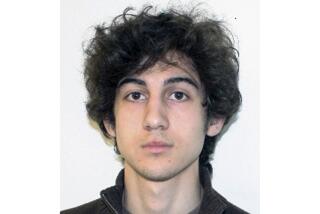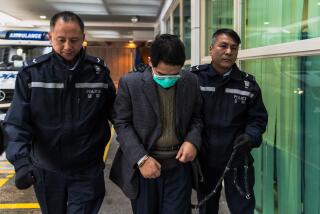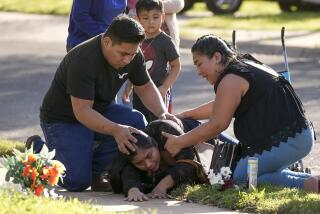Brothers suspected in Boston attack stood apart in U.S.
BOSTON — During their decade in the United States, the two brothers suspected in the Boston Marathon bombings had acquired many of the preoccupations of young American men — cars, sports, social media.
But Tamerlan Tsarnaev, 26, and Dzhokhar Tsarnaev, 19, whose family fled Russia’s troubled Caucasus region, showed signs of alienation from the country that had embraced them as refugees.
“I don’t have a single American friend, I don’t understand them,” Tamerlan said, as reported in an online photo essay that shows him training for a boxing competition that he hoped would lead to a place on the U.S. Olympic team and naturalized citizenship.
Their uncle, Ruslan Tsarni, said he hadn’t seen them for eight years but had never known them to harbor ill will against the United States. He said that he “never, ever would imagine that somehow the children of my brother would be associated” with Monday’s bombings, which left three people dead and more than 170 injured.
Tamerlan Tsarnaev was killed early Friday in a confrontation with police and police said his younger brother was taken into custody Friday night. Asked what he thought might have motivated them to set off bombs, their uncle said, “Being losers, hatred to those who were able to settle themselves — these are the only reasons I can imagine.”
He said it had nothing to do with their Muslim religion. He urged his nephew to surrender. “If you are alive, turn yourself in, and ask for forgiveness from the victims, the injured and from those who are left,” Tsarni told reporters outside his home in Montgomery Village, Md.
The suspects’ father, Anzor Tsarnaev, an ethnic Chechen, refused to believe his sons had anything to do with the bombings. “I have no doubt they were set up,” he said in a telephone interview from the Dagestan region of Russia, near Chechnya.
Reached in Toronto, Maret Tsarnaeva, the suspects’ aunt, angrily echoed that sentiment.
She said it was a conspiracy. “They never had any resentment — they loved this country dearly, otherwise they would go back” to Russia, she said.
A federal law enforcement official said Friday night that in 2011, Tamerlan Tsarnaev was interviewed by the FBI. “The conversation happened at the request of a foreign government,” the official said, but declined to name that government.
The official added: “There was nothing derogatory that came out of that interview. And we closed the matter. We were running certain traps to be checked for them, and there was nothing significant that resulted from it. If there had been, that would have been totally different.”
Some classmates remembered the older Tsarnaev from his days at Cambridge Rindge & Latin School, a public high school in the Boston suburb.
“He was a cool dude, a nice guy,” said Nicolas G. Hercule, who was on the volleyball team with him. He described reports that Tsarnaev was a suspect as “insane … hard to believe.”
After high school, Tsarnaev studied engineering at Bunker Hill Community College in the Boston suburb of Charlestown. He devoted himself to boxing, and had a reputation for his willingness to spar with bigger, better fighters.
“He came off as a cocky guy, an arrogant guy,” said Kendrick Ball, a boxing trainer at a gym in Worcester, Mass., where Tsarnaev sometimes sparred. “He got in the ring with no headpiece, no mouthpiece. He definitely was a tough guy. I usually don’t let people do that.”
Ball remembered him wearing “tight jeans and silver boots,” a style of dress that set him apart from other boxers. “He just didn’t look like a boxer — more like a pretty boy,” Ball said.
In a photo essay called “Will Box for Passport,” a website describes him as a 196-pound boxer who had taken a semester off college to train.
He hoped to represent New England in the heavyweight category at the National Golden Gloves Tournament of Champions in Salt Lake City.
If he won enough fights, Tsarnaev said on the site, he might be selected for the U.S. Olympic team and become a naturalized citizen. Unless Chechnya became independent, he said, he would rather compete for the United States than for Russia.
“I like the USA. ... America has a lot of jobs. That’s something Russia doesn’t have. You have a chance to make money here if you are willing to work,” he told the Lowell Sun newspaper in 2004.
The website said Tsarnaev fled Russia with his family because of the conflict in Chechnya in the early 1990s and lived for years in Kazakhstan before coming to the United States.
He described himself as a Muslim who abjured smoking and drinking. “God said no alcohol,” he said, and lamented: “There are no values anymore.” He said he worried that “people can’t control themselves.”
On the website, he said he drove a Mercedes, dressed fashionably (“European style,” he called it), liked the movie “Borat” and had little respect for kick boxers. One photo showed him shirtless, but he said he usually covered himself because he is very religious and didn’t want to stir lust in women.
In a YouTube channel he created last year, he cached videos about Russians converting to Islam, including one who turned to Shiism, a choice he seemed to denigrate. He also included inspirational videos of scholars who spoke about Islam and how the religion inspires believers and cleanses them of their sins.
In 2009, Boston police arrested him on charges that he had assaulted his girlfriend. The disposition of the case was unclear.
His brother, Dzhokhar, provided glimpses of his own life and interests on a Russian-language social networking site.
He said he went to grade school in Dagestan and spoke English, Russian and “Nokhchiin Mott,” a Chechen language.
He described his world view as “Islam,” but his priorities as “Career and money.” He said he belonged to religious and secular social media groups linked to Chechnya.
His most recent post, from March 2012, was a humorous video of his brother doing imitations of various accents of people from the Caucasus region, much the way an American might mimic regional accents in this country.
The younger Tsarnaev became a naturalized U.S. citizen later that year — on Sept. 11 — according to a U.S. official who had been briefed on the investigation.
He was on the wrestling squad at Cambridge Rindge & Latin School, where he impressed people as a swift, decisive competitor and became team captain. “We called him our brother from Chechnya,” said former teammate Tom Barrasso, 18.
Barrasso said he once asked him, “What is Chechnya?” He recalled Tsarnaev giving a capsule description “sort of like Wikipedia,” but not revealing any deep feelings.
“He was a quiet guy,” Barrasso said. “This was nothing you’d ever expect from him.”
The younger Tsarnaev is enrolled at the University of Massachusetts Dartmouth, an hour’s drive south of Boston.
An acquaintance said he attended a mosque on Prospect Street in Cambridge. “He would drink with us, he would smoke with us, he wasn’t too religious, but he was Muslim obviously,” said Ty Barros, 21, of Cambridge.
Barros said he had never heard him say anything radical. “There’s definitely nothing that would indicate that to me — no red flags,” said Barros.
When authorities released photos of the bombing suspects, Barros said, “I joked with some friends, ‘It looks like Dzhokhar!’ It was ridiculous to me. That’s why I made the joke.”
Caprice Ruff, 18, who attended high school with the younger Tsarnaev, said she last saw him about 10:30 p.m. Sunday, skateboarding near his house on Norfolk Street. He wore a hoodie and jeans and seemed fine, “like there was nothing major” going on.
But Gilberto Junior, 44, owner of an auto body shop across the street from the suspects’ home in Cambridge, perceived something amiss when Dzhokhar Tsarnaev came by Tuesday, the day after the bombings.
He said Tsarnaev came to claim a white Mercedes he had recently dropped off for a bumper repair.
The repairs were not yet done.
“He was very nervous, biting his nails, agitated,” Junior said. “I thought he was on drugs, medication.” He didn’t report it to police.
He said Tsarnaev would bring in cars for repairs all the time, often for wealthy friends from Boston University and MIT.
He said Tsarnaev seemed polite, paid cash, coveted nice rims and paint jobs, liked to chat about soccer, and didn’t express his political views.
“I feel frustrated because I was next to him,” said Junior, a 20-year resident of Boston. “This is my city. That’s why I’m frustrated with myself.”
molly.hennessy-fiske@latimes.com
Hennessy-Fiske reported from Boston, Bengali and Gold from Washington. Times staff writers Sergei L. Loiko in Moscow, Neela Banerjee, Richard Simon and Brian Bennett in Washington and Laura J. Nelson, Marisa Gerber, Matt Pearce and Christopher Goffard in Los Angeles contributed to this report.
More to Read
Start your day right
Sign up for Essential California for news, features and recommendations from the L.A. Times and beyond in your inbox six days a week.
You may occasionally receive promotional content from the Los Angeles Times.








